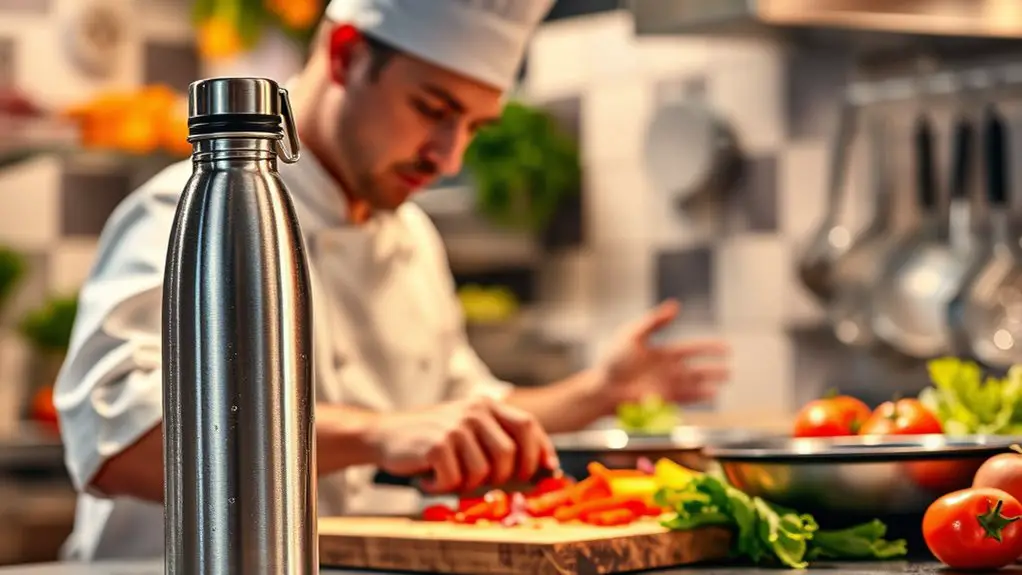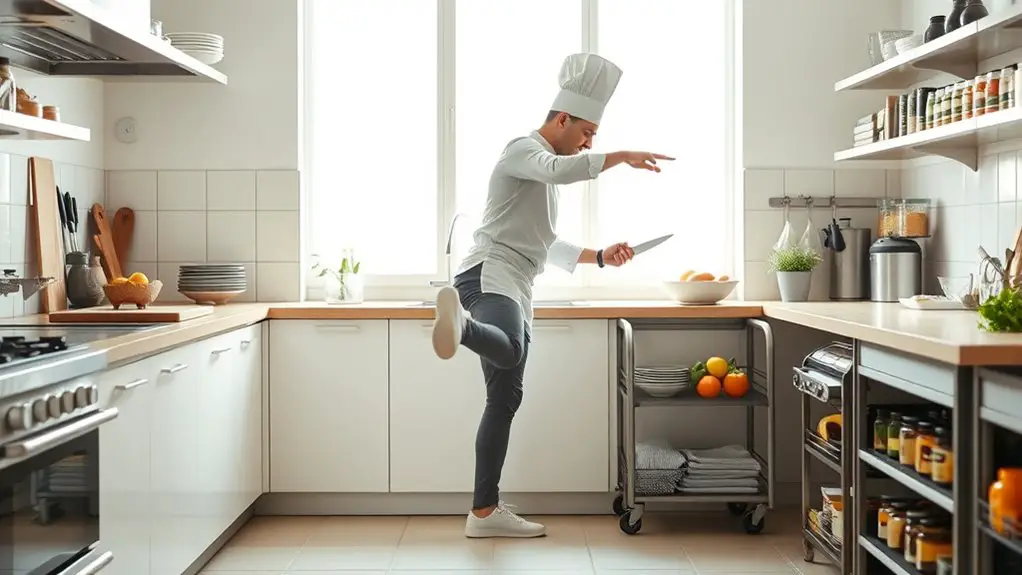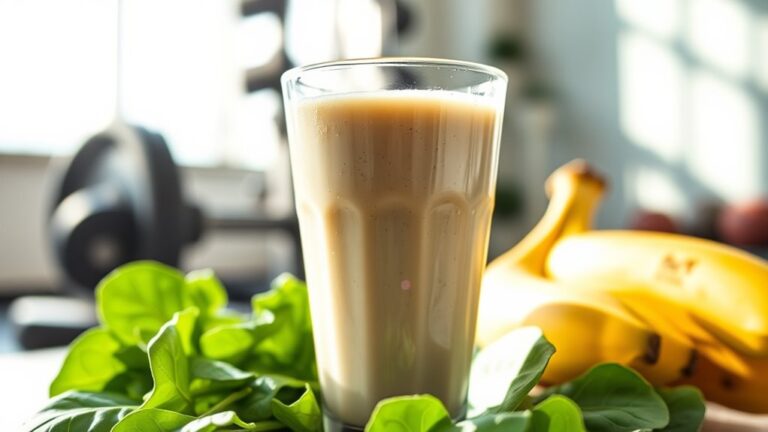How Chefs Can Stay Fit Despite Long Hours in the Kitchen

As a chef, you can stay fit despite long hours by prioritizing balanced meals for sustained energy, snacking on healthy options, and staying hydrated throughout your shift. Incorporate quick workouts during breaks and optimize your workstation for easy movement. Don’t forget to practice mindfulness to manage stress, and guarantee you get adequate rest and recovery. These strategies can make a significant difference. There’s even more you can do to enhance your fitness in the kitchen.
Prioritize Nutrition for Sustained Energy

While you might be tempted to skip meals during a busy shift, prioritizing nutrition is vital for maintaining your energy levels as a chef. Meal prepping can save you time and guarantee you have balanced meals ready to go. By dedicating a few hours on your day off to prepare healthy options, you’ll be less likely to grab unhealthy snacks when hunger strikes.
Healthy snacking throughout your shift is important, too. Keep options like nuts, yogurt, or fruit handy to sustain your energy. Don’t underestimate the significance of nutrient timing; eating at regular intervals can help you avoid energy crashes.
Aim for balanced meals that include proteins, carbs, and healthy fats to fuel your long hours. By focusing on your nutrition, you’ll not only feel better but also perform better in the kitchen, allowing you to create delicious dishes safely and efficiently.
Incorporate Short Workouts During Breaks
Since long hours in the kitchen can leave you feeling drained, incorporating short workouts during breaks can rejuvenate your energy and focus. Try to squeeze in quick sessions of interval training, which can boost your metabolism and help you stay sharp. You don’t need a gym; bodyweight exercises like squats, push-ups, or lunges are perfect for those limited minutes.
Even just five to ten minutes of movement can work wonders. Set a timer and challenge yourself to complete as many reps as possible. This not only keeps you active but also promotes a sense of accomplishment. Additionally, incorporating activities like skipping rope can serve as an excellent full-body workout to further enhance your fitness during breaks.
Remember to maintain proper form to avoid any injuries, especially when you’re on a tight schedule. If you’re feeling sore or fatigued, listen to your body and opt for gentler stretches or yoga poses instead. Incorporating these short workouts can be a game changer for your energy levels and overall well-being.
Stay Hydrated Throughout the Day

Staying hydrated is key to keeping your energy up and your mind sharp in the kitchen. It’s not just about drinking water; there are plenty of hydration-friendly beverages you can enjoy too. Plus, setting reminders can help you stay on track throughout your busy day.
Importance of Water Intake
Hydration is essential for maintaining your energy levels and focus in the bustling environment of a kitchen, where every moment counts. Staying properly hydrated not only enhances your performance but also supports overall health. Here are some hydration tips to keep in mind:
- Drink water regularly, even if you don’t feel thirsty.
- Keep a water bottle nearby for easy access.
- Set reminders to take hydration breaks during shifts.
- Incorporate water-rich foods like fruits and veggies into your meals.
- Monitor your urine color; it should be light yellow.
Hydration-Friendly Beverage Options
Finding the right beverages can make a big difference in how well you stay hydrated throughout your busy day as a chef. Staying hydrated isn’t just about water; consider incorporating herbal teas and infused waters into your routine. These options not only keep you hydrated but also add flavor without extra calories.
Here’s a quick guide:
| Beverage Type | Benefits | Tips |
|---|---|---|
| Herbal Teas | Calming, caffeine-free | Drink warm or chilled |
| Infused Waters | Flavorful, vitamin-rich | Use fruits and herbs |
| Coconut Water | Electrolyte-rich | Opt for low-sugar options |
Setting Hydration Reminders
While it’s easy to forget to drink water during a hectic shift, setting hydration reminders can help keep you on track. Staying hydrated is essential for your health and safety in the kitchen. Here are some effective reminder techniques you can use:
- Download hydration apps that send notifications
- Set alarms on your phone to drink water every hour
- Use a water bottle with time markers
- Create visual reminders around your workspace
- Pair drinking water with routine tasks, like after chopping or plating
Incorporating these strategies can guarantee you stay hydrated, boosting your energy and focus. Remember, a well-hydrated chef is a safer, more efficient chef!
Optimize Your Workstation for Movement

To stay active and prevent fatigue during long shifts, it’s essential to optimize your workstation for movement. Start by incorporating ergonomic tools that reduce strain on your body. An efficient layout is key; arrange your workspace so that everything you need is within easy reach, minimizing unnecessary movements. Consider implementing movement routines throughout your shift, like quick footwork or torso twists, to keep your blood flowing.
Workspace flexibility is important, too; try to adjust your station height for various tasks. An organized kitchen not only boosts efficiency but also guarantees safety, reducing the risk of accidents. Remember to schedule regular stretch breaks to relieve tension and improve circulation. Reflect on your equipment placement—keep frequently used items close and heavier objects at waist level to avoid strain. By adopting these active design principles, you can cultivate a healthier, more dynamic kitchen environment.
Practice Mindfulness and Stress Relief
Practicing mindfulness can greatly enhance your well-being as a chef, especially during the high-pressure moments of a busy kitchen. By incorporating techniques like mindful breathing, you can improve your stress management and focus. Here are some simple strategies you can use:
- Take short breaks to breathe deeply and center yourself.
- Visualize a calm place to reduce anxiety and tension.
- Maintain a positive mindset, focusing on what you can control.
- Engage in brief stretching exercises to relieve physical stress.
- Set aside a few minutes each shift for quiet reflection.
Schedule Regular Physical Activity
Incorporating regular physical activity into your routine can greatly boost your energy levels and overall fitness as a chef. With long hours in the kitchen, it’s essential to find ways to fit exercise into your day. Consider flexible scheduling to accommodate your shifts and create a consistent workout plan. Group workouts can also be a fun and motivating way to stay active while fostering camaraderie with your colleagues. Here’s a simple weekly plan to inspire you:
| Day | Activity |
|---|---|
| Monday | 30-minute yoga |
| Wednesday | 1-hour group run |
| Friday | 45-minute strength training |
| Saturday | 1-hour dance class |
Additionally, incorporating exercises like skipping rope can provide a full-body workout that enhances cardiovascular health and aids in weight loss.
Get Adequate Rest and Recovery
Staying fit as a chef isn’t just about staying active; it’s also about getting enough rest and recovery. Long hours in the kitchen can take a toll on your body, so it’s essential to prioritize rest techniques and recovery strategies. Here are some effective ways to guarantee you’re fully recharged:
- Set a consistent sleep schedule to help regulate your body’s internal clock.
- Incorporate short breaks during your shifts to stretch and recharge.
- Practice mindfulness or meditation to reduce stress and enhance focus.
- Stay hydrated to support overall health and recovery.
- Utilize foam rolling or gentle yoga to ease muscle tension after long shifts.
Frequently Asked Questions
How Can I Find Time for Meal Prep During Busy Shifts?
Finding time for meal prep during busy shifts can be tough, but with some meal prep strategies, you can make it work. Try batch cooking on your days off, focusing on efficient cooking methods like roasting or stir-frying. Use safe food storage techniques to keep prepped meals fresh. Even setting aside just 30 minutes for quick prep can help you maintain healthy eating habits, ensuring you stay energized during those long shifts.
What Are Quick, Healthy Snack Ideas for Chefs?
You’re in a whirlwind of culinary chaos, and you need quick, healthy snack ideas that won’t crumble under pressure. Think of energy bars as your superhero sidekick—packed with protein and perfect for those fleeting moments. Fresh fruit, like apples or bananas, offers a burst of energy, while Greek yogurt or hummus with veggies are safe, nutritious options. Keep these healthy snacks handy, and you’ll conquer your shifts without sacrificing your well-being!
How Do I Motivate Myself After a Long Shift?
After a long shift, it can be tough to find motivation. To recharge, focus on post-shift relaxation techniques like deep breathing or gentle stretching. These can help release tension and rejuvenate your body. Consider energy-boosting techniques, too, like sipping herbal tea or enjoying a light, nutritious snack. Remember, it’s important to prioritize your well-being, so listen to your body and give yourself the time you need to unwind and recover.
Are There Specific Exercises for Improving Kitchen Agility?
To improve your kitchen agility, focus on exercises that enhance balance and flexibility. Incorporate balance training exercises, like single-leg stands or stability ball workouts, to strengthen your core and improve coordination. Don’t forget kitchen stretches, such as shoulder rolls and hamstring stretches, to keep your muscles limber and reduce injury risk. By adding these exercises to your routine, you’ll feel more agile and safer while maneuvering the demands of a busy kitchen.
How Can I Manage Stress Without Unhealthy Eating Habits?
Managing stress without succumbing to unhealthy eating habits is essential. Start by practicing mindful eating; savor each bite and listen to your body. Create a calming routine that incorporates relaxation techniques like deep breathing or meditation. Consider physical activities, such as walking or yoga, to release tension. Set small, achievable goals for your meals to keep you focused. By prioritizing stress management, you can foster a healthier relationship with food and yourself.





